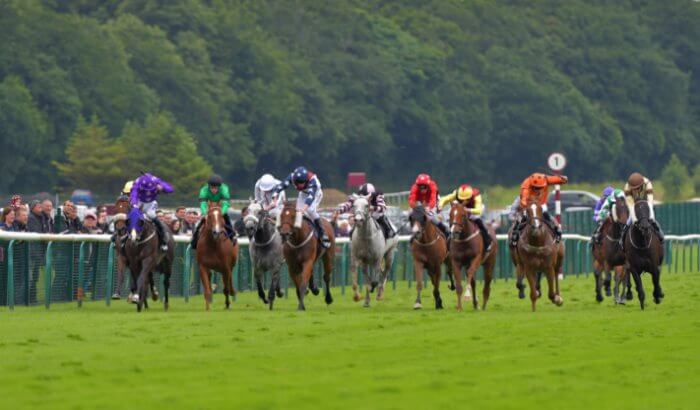What is an each-way bet
< Return to what is a single betGo to what is a place bet >
· An 'Each-way' bet is made up of two components, a win bet and a place, which means that if your selection wins the race, you are paid out on both, though should your horse only finish in the places, you will still receive a return at the place terms.
For those looking to place a wager on a horse race each-way bets are a popular choice. The structure of an each-way bet is straightforward, with half of the stake going on the selection to win and half being bet on the selection to ‘place’, usually in the top two, three or four positions in the race.
Each-way bets are therefore a good way to get your stake back and still make some profit even if your horse doesn’t win. You will often see this type of bet abbreviated to EW or E/W.
Understanding the returns you can make from each-way wagers does require a few sums and with bookmakers like Betfair and Paddy Power they offer each-way betting calculators to help punters with the maths.
EACH-WAY: WIN & PLACE BETS
An each-way bet essentially comprises two wagers, one on the win and one on a place. Half the stake is placed on the win and half the stake is wagered on a place finish. For the win bet to pay out the selection must finish first, whilst for the place bet to be successful the selection has to either win or cross the finish line in one of the top two, three or four places. In the biggest races, like the Grand National, some bookmakers even extend the each-way place terms down to the fifth, sixth or seventh-place finishers.
If there are fewer than five horses in a race then bookmakers are unlikely to offer each-way odds. The number of places which count for an each-way place bet to pay out varies according to bookmaker, market, type of race and the number of runners. Typically though the breakdown will look like this:
- Five to seven runners (non-handicap): 1/4 (one quarter) win odds on first and second places
- Eight or more runners (non-handicap): 1/5 (one fifth) win odds on first, second and third places
- Five to seven runners (handicap): 1/4 win odds on first and second places
- Eight to 11 runners (handicap): 1/5 win odds on first, second and third places
- 12 to 15 runners (handicap): 1/4 win odds on first, second and third places
- 16 or more runners (handicap): 1/4 win odds on first, second, third and fourth places
Similar place terms are usually applied to greyhound racing. You will note the reference to handicap and non-handicap races above. In handicap races horses are allotted specific weights to carry based on previous performances, with the best horses carrying heavier loads in order to encourage closer finishes.
Famous races such as the Grand National and the Melbourne Cup are handicaps and many bettors place each-way bets on those races, given the high number of runners and unpredictability involved. Always keep an eye out for late non-runners as this can alter the odds at the last minute.

CALCULATING YOUR RETURNS
When placing an each-way bet you are usually looking for a horse to place in the top two to four positions depending on the number of runners. You are probably also looking to back a horse with odds of greater than 4/1 or 5/1 (depending on whether the place terms are 1/4 or 1/5 of the odds, see above), if you want your each-way bet to return a profit if the horse is placed.
Remember, your stake is split 50/50 on a win bet and a place bet. Let’s say you back a horse at 10/1 each-way, putting down £4, of which £2 is bet on the horse to win and £2 of the stake is wagered on the horse to place first, second or third. There are 10 runners in the race and the each-way bet terms offer one fifth of the win odds for a place.
If your selection is victorious, the ‘win’ part of the wager pays out in the normal way, so £2 at 10/1 equals £20 profit – and the return of your £2 win bet stake brings the return up to £22.
Meanwhile, the place part of the bet gives you an additional £6 return. This is made up of the £2 stake coming back to you, plus your winnings from the place part (£2 x one fifth of 10/1 = £4). Overall, you pocket £28 – £24 profit plus your £4 stake back.
If you had only backed the horse to win, putting your full £4 on a single bet for the victory at 10/1, you would have won £40, plus the return of your stake, which is a £44 return. Of course though, the risk is greater there.
However, in the case that your horse fails to win but places second or third in the above each-way example, you lose the £2 staked on the win bet, but you’d still get the £6 back from the place bet part of your each-way wager. Again, this is the £2 stake returned, plus £4 winnings (£2 placed each-way at 10/1, divided by five). This means you’ve still made a decent 50% profit on the £4 staked, even though your horse did not win.
With odds under 4/1 or 5/1, each-way bets rarely make sense. In the example above: if the odds were just 2/1 instead of 10/1 and your horse came home in second place, you would get just £2.80 back from the £4 wagered. You reduced your losses but are still out of pocket.
EACH-WAY FOOTBALL BETS
Away from horse and greyhound racing each-way bets can also be placed on sports such as football, golf, tennis, cycling and Formula 1.
In football, there are only two participants in a game, so each-way bets are generally made on a league or tournament. An each-way bet might be on your chosen team to win the FIFA World Cup (win) or get to the final (place). Say you are willing to wager a fiver each-way on England to win the World Cup at 9-1 (£10 total stake), with 1/3 win odds to place first or second:
For the win bet part of the wager the potential returns are £50 = (£5 x 9) + returned stake
For the place bet part of the wager the potential returns are £20 = (£5 × one third of 9) + returned stake
If England win the World Cup (they got closer than many expected in 2018) the profit would be £60 and the total returned is £70. Enough to pay for a decent celebration! If England lose in the final you will be pretty disappointed if you are an Englishman, but you will still get a £20 return and therefore you’ve still made a profit of £10. If England don’t make the final then the bet is lost, but there was hopefully still plenty of excitement along the way.
You can place similar bets every season on competitions like the UEFA Champions League and Europa League. When you are looking up who to back each-way, check out reliable football stats websites such as Infogol for essential tips and extensive information on every team.
< Return to what is a single betGo to what is a place bet >
Plus, don't forget to check out our bet calculator, where you can calculate your winnings.















